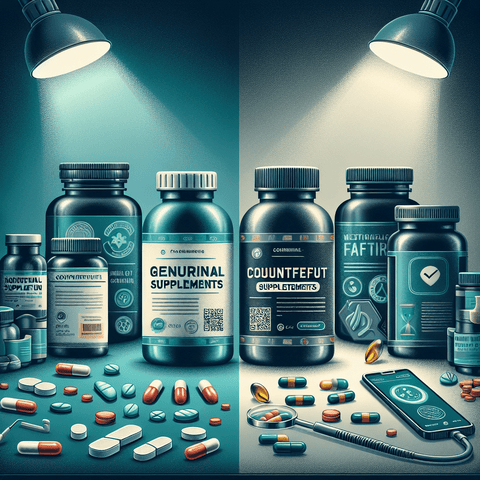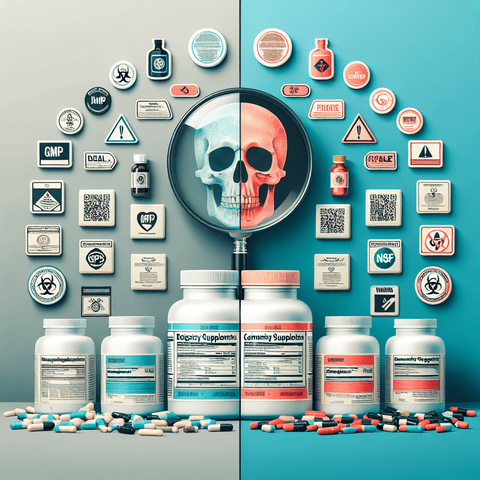Introduzione
Negli ultimi anni, l'industria globale degli integratori alimentari ha registrato una crescita esplosiva. Con la crescente consapevolezza sulla salute, l'aumento dell'interesse per la prevenzione sanitaria e la popolarità di stili di vita incentrati sul benessere, milioni di consumatori ora assumono integratori alimentari per colmare carenze nutrizionali, aumentare l'energia o supportare vari aspetti del benessere. Dagli integratori vitaminici e minerali quotidiani a prodotti specializzati come probiotici, omega-3 ed estratti erbali, gli integratori sono diventati un elemento essenziale in molte case. Tuttavia, questa crescente domanda ha anche dato spazio a un mercato parallelo pericoloso—integratori contraffatti. Proprio come le borse e gli elettronici falsificati invadono i mercati non autorizzati, così accade anche con i prodotti per la salute fraudolenti. Queste contraffazioni non solo ingannano finanziariamente i consumatori ma possono anche rappresentare seri rischi per la salute. Secondo varie autorità regolatorie internazionali, tra cui FDA e EMA, il mercato dei prodotti per la salute contraffatti sta crescendo, con integratori falsi che rappresentano una parte significativa dei beni sequestrati. Immagina di assumere inconsapevolmente un integratore contraffatto che non contiene principi attivi—o peggio, sostanze dannose. Per i consumatori che cercano di migliorare la propria salute, un tale tradimento può essere devastante. Questa guida mira a proteggere il tuo percorso verso il benessere fornendoti gli strumenti e le conoscenze per identificare integratori contraffatti, smascherare tattiche fuorvianti, verificare l'autenticità e fare acquisti informati da fonti affidabili come TopVitamine.com. La nostra missione è semplice: aiutarti a identificare vitamine e integratori falsi in modo da poter proteggere la tua salute, evitare truffe e ottenere il massimo valore da prodotti autentici ed efficaci.Comprendere i pericoli degli integratori contraffatti nell'industria nutrizionale
Gli integratori contraffatti sono prodotti fabbricati fraudolentemente che imitano integratori alimentari legittimi ma non soddisfano gli standard di qualità o normativi. Potrebbero essere completamente falsi, etichettati in modo errato o adulterati con sostanze non approvate. A differenza dei prodotti genuini realizzati secondo le Buone Pratiche di Fabbricazione (GMP), questi integratori falsi vengono spesso creati in strutture non regolamentate utilizzando ingredienti di scarsa qualità. L'infiltrazione di integratori contraffatti nel mercato è facilitata in gran parte dal commercio elettronico globale. Le piattaforme online, specialmente quelle che consentono venditori terzi, possono diventare terreno fertile per prodotti fraudolenti. Offline, negozi al dettaglio o bancarelle della salute non regolamentate possono avere in stock prodotti contraffatti senza che i clienti o persino i venditori stessi lo sappiano. Uno dei maggiori rischi associati agli integratori contraffatti è la contaminazione. Questi prodotti possono contenere batteri, metalli pesanti o agenti farmaceutici non dichiarati. Ad esempio, alcuni integratori dimagranti contraffatti sono stati trovati contenere sibutramina, un soppressore dell'appetito vietato noto per causare problemi cardiovascolari. Tali additivi possono portare a reazioni allergiche, danni al fegato o peggio. Un altro problema comune è quello delle dosi errate o non dichiarate. Un falso integratore di magnesio potrebbe dichiarare 250 mg per capsula, ma non fornire nulla—o livelli potenzialmente pericolosi che superano ampiamente i limiti giornalieri sicuri. Ciò non solo riduce l'efficacia ma aumenta il rischio di tossicità o interazione con farmaci prescritti. Inoltre, gli integratori contraffatti spesso mancano di forme bio-disponibili o attive di nutrienti. Un esempio comune riguarda gli integratori di omega-3 contraffatti che sostituiscono oli più economici e inefficaci al posto del DHA o EPA. Un consumatore che si aspetta supporto cardiovascolare potrebbe invece ingerire olio vegetale senza benefici evidenti per la salute. Enti regolatori come l'Autorità Europea per la Sicurezza Alimentare (EFSA), la Food and Drug Administration (FDA) statunitense e l'Organizzazione Mondiale della Sanità (OMS) hanno tutti lanciato allarmi. Tuttavia, a differenza dei farmaci, gli integratori alimentari non sono sempre soggetti a rigorose approvazioni pre-commercializzazione, rendendo il settore particolarmente vulnerabile. Continuano a emergere esempi reali. In Europa, diversi casi hanno rivelato prodotti di vitamina D contraffatti che non contengono colecalciferolo o ergocalciferolo. Negli Stati Uniti, individui hanno richiesto il ricovero ospedaliero dopo aver assunto integratori a base di erbe commercializzati falsamente e mescolati con steroidi sintetici. Alla fine, questi pericoli evidenziano un urgente bisogno di consapevolezza da parte dei consumatori. Comprendere la minaccia degli integratori contraffatti è il primo passo per evitarli—e proteggere la tua salute e il tuo benessere finanziario a lungo termine.Vitamine false: segnali d'allarme che indicano che il tuo integratore potrebbe non essere reale
Le vitamine false sono uno dei tipi più diffusi di integratori contraffatti. Dalla vitamina C alla vitamina K, questi prodotti fraudolenti spesso imitano sottilmente marchi autentici, rendendoli più difficili da distinguere. Imparare a riconoscere i segnali d'allarme associati alle vitamine false può abbassare significativamente il rischio. Uno degli indicatori più ovvi è l'imballaggio scadente. I marchi di integratori genuini investono in etichette di alta qualità e sigilli anti-manomissione. Presta attenzione a testi sbiaditi, etichette piegate o male incollate, loghi obsoleti o incongruenze di design rispetto all'imballaggio legittimo noto. Errori di ortografia, errori grammaticali o liste di ingredienti mancanti sono segnali di avvertimento definitivi. Successivamente, ispeziona le caratteristiche fisiche del prodotto. Le vitamine autentiche hanno dimensioni, colore e rivestimento coerenti specifici per la loro formulazione. Le vitamine false possono variare da capsula a capsula o avere gusto e odore insoliti. Ad esempio, un DHA+EPA olio di pesce falsificato potrebbe avere un odore rancido o un aspetto torbido, a differenza dei prodotti genuini elencati su TopVitamine.com che aderiscono a rigorosi standard di purezza. Un altro grande segnale d'allarme è il prezzo. Sebbene a tutti piaccia un buon affare, se un integratore viene venduto a un prezzo fortemente scontato—specialmente da un venditore sconosciuto—dovrebbe destare sospetti. Fai particolare attenzione a promozioni come "acquista uno, ricevi tre gratis" su articoli di alto valore come multivitaminici o integratori di magnesio. I truffatori spesso attirano i clienti offrendo prezzi inferiori a quelli di mercato equi. Rivendicazioni sulla salute esagerate sono anche un segno distintivo degli integratori contraffatti. Frasi come "garantito per curare," "100% efficace," o "sostituisce tutti i tuoi medicinali" non sono solo fuorvianti—spesso segnalano truffe. Gli integratori sospetti possono promuovere benefici non valutati dall'EFSA, come la cura di malattie croniche o la perdita di peso miracolosa in pochi giorni. Gli integratori falsi spesso imitano marchi popolari ma falliscono nel riprodurre loghi, caratteri o codici a barre. I falsari copiano abilmente marchi come Solgar, NOW Foods o Pure Encapsulations, ma errori nella progettazione delle etichette, indirizzi di produzione mancanti o informazioni sui supplementi errate dovrebbero segnalare cautela. Quando hai dubbi, fidati del tuo istinto. Se un prodotto sembra sospetto, è meglio saltare l'acquisto e comprare da rivenditori consolidati e affidabili come TopVitamine.com. Essi si riforniscono direttamente da produttori certificati e offrono garanzie di autenticità.Autenticità degli integratori: come assicurarsi di ottenere ciò per cui hai pagato
Garantire l'autenticità degli integratori può essere proattivo ed empowwerante. A differenza dei falsari, i marchi legittimi implementano meccanismi di verifica multipli per garantire la fiducia dei consumatori. Sapere come utilizzare questi strumenti può aiutare a confermare che stai acquistando un prodotto genuino. Uno dei primi passi è scansionare i codici a barre, numeri di lotto o QR code dei prodotti. Molti produttori affidabili, come quelli rappresentati su TopVitamine, includono codici scansionabili sulle loro etichette. I consumatori possono scansionarli con app o smartphone per verificare l'autenticità del prodotto direttamente sul database del produttore. Le certificazioni di terze parti offrono ulteriore sicurezza. Cerca certificazioni da organizzazioni come NSF International, USP (U.S. Pharmacopeia) o GMP (Good Manufacturing Practices). Questi sigilli indicano che l'integratore è stato testato per qualità, purezza e composizione. I prodotti europei possono vantare certificati EFSA o ISO per il controllo del lotto, la pulizia e l'accuratezza. Esamina sempre le date di scadenza e i numeri di lotto stampati direttamente sulla bottiglia—non solo sulla scatola. Una data mancante o alterata è un segnale d'allarme significativo. Allo stesso modo, cambiare etichette o integratori contraffatti potrebbero presentare numeri di lotto non corrispondenti sulla scatola e sulla bottiglia. La trasparenza degli ingredienti è un altro aspetto vitale dell'autenticità degli integratori. I marchi affidabili elencheranno la fonte del nutriente (ad esempio, vitamina D3 derivata dal lichene o vitamina K2 MK-7), la dose per unità e eventuali aiuti di formulazione aggiuntivi. Se gli ingredienti sono descritti vagamente o completamente mancanti, sospetta un comportamento scorretto. Inoltre, i siti web dei marchi legittimi includeranno specifiche dettagliate del prodotto, avvertenze di sicurezza e certificati di analisi (COA). I consumatori possono confrontare l'aspetto e il numero di lotto del proprio integratore con immagini e dettagli pubblicati online. Piattaforme come TopVitamine.com offrono descrizioni complete del prodotto insieme a collegamenti a ricerche basate su prove e informazioni sull'uso raccomandato. Alcune app possono ulteriormente rafforzare la tua fiducia. Strumenti come “Supplement Checker” e “Check My Supplement” consentono agli utenti di autenticare i prodotti utilizzando codici a barre o inserendo manualmente numeri seriali. Sebbene non siano infallibili, sono utili quando usati insieme alle migliori pratiche menzionate sopra. In sintesi, verificare l'autenticità degli integratori richiede una combinazione di tecnologia, scrutinio delle etichette e trasparenza del marchio. Rendi questi passaggi una parte regolare del tuo processo di acquisto per assicurarti di consumare ciò per cui hai effettivamente pagato.La verità sulle truffe degli integratori per la salute e i trucchi di marketing
Anche quando il prodotto stesso non è completamente falso, il marketing ingannevole può far apparire legittimo un integratore fasullo. Le truffe sugli integratori per la salute spesso si affidano a appelli emotivi, gergo medico-scientifico e tattiche di pressione per separare i consumatori dai loro soldi—e mettere a rischio la loro salute. Le truffe comuni includono la promozione di un prodotto come "cura miracolosa." Ad esempio, un integratore per il dolore articolare potrebbe affermare "recupero completo in 24 ore" o pubblicizzarsi come "approvato dai medici," anche quando nessun professionista o ricerca credibile supporta l'affermazione. Queste affermazioni sensazionali sono spesso non supportate e violano i regolamenti EFSA, che vietano affermazioni sanitarie non autorizzate sugli integratori. Un altro trucco prevalente coinvolge testimonianze di celebrità o influencer. I truffatori potrebbero utilizzare impropriamente l'immagine di una figura nota insieme a citazioni false che suggeriscono il supporto per il loro prodotto. Allo stesso modo, le recensioni dei clienti possono essere completamente inventate o pagate, gettando dubbi sulla legittimità delle storie di successo. Le truffe di abbonamento sono anche diffuse. I siti web offrono una "prova gratuita" per provare un prodotto ma nascondono nei dettagli fini informazioni su un abbonamento automatico. Una volta terminata la prova, il cliente viene addebitato tariffe mensili esorbitanti e spesso trova impossibile annullare l'abbonamento. La pubblicità ingannevole può anche posizionare un integratore come "clinicamente provato" o "approvato dalla FDA." Tuttavia, gli integratori alimentari non necessitano di approvazione FDA prima della vendita, e la maggior parte non è sottoposta a studi clinici equivalenti a quelli dei farmaci. Qualsiasi affermazione che suggerisca altrimenti dovrebbe far scattare campanelli d'allarme. Le autorità emettono regolarmente avvisi contro prodotti truffa. Nell'UE, RAPEX (Rapid Alert System for Dangerous Non-Food Products) riporta integratori sospetti con pericoli chimici, e negli Stati Uniti, l'Indice di Frode Sanitaria della FDA elenca venditori e prodotti sotto inchiesta. La triste verità è che queste truffe sono ben orchestrate. I truffatori sfruttano le vulnerabilità attraverso pagine che sembrano autoritative dal punto di vista medico ma mancano di un supporto scientifico legittimo. Per rimanere al sicuro, i consumatori devono attenersi a fornitori provati e certificati come TopVitamine.com, che verifica attentamente ogni prodotto e venditore prima di elencarlo. Proteggiti dalle truffe sugli integratori rimanendo scettico verso affermazioni straordinarie, evitando prodotti con ingredienti vaghi e mai fornendo pagamento o informazioni personali a meno che tu non comprenda appieno i termini del contratto.Riconoscere integratori falsi: consigli che ogni consumatore dovrebbe conoscere
Sebbene tutti possano essere ingannati a volte, incorporare determinate abitudini di ricerca nella tua routine di acquisto di integratori può ridurre drasticamente il rischio di acquistare integratori falsi. Ecco come puoi diventare un consumatore più intelligente e astuto. Inizia con la ricerca. Prima di provare qualsiasi nuovo integratore, cerca il prodotto e il produttore. I marchi affidabili hanno siti web ben consolidati, ricerche documentate e branding coerente. Controlla le recensioni di terze parti su forum di nutrizione, blog scientifici o recensori indipendenti—non solo sul sito web del venditore. Visita il sito ufficiale del marchio per identificare i venditori autorizzati. Molti produttori leader di integratori forniscono un elenco di rivenditori e distributori approvati. Questo assicura che tu non stia acquistando un prodotto che è stato etichettato nuovamente o mal gestito da rivenditori non autorizzati. Acquista sempre da marketplace affidabili. Fare shopping da un sito certificato come TopVitamine.com garantisce l'integrità del prodotto, condizioni di conservazione appropriate e responsabilità. Le piattaforme affidabili mostrano informazioni di contatto complete, politiche di reso, trasparenza sui test di laboratorio e disponibilità del servizio clienti. Il feedback dei clienti è un altro utile strumento di verifica—ma sii cauto. Cerca recensioni dettagliate che menzionino numeri di lotto, prestazioni del prodotto ed effetti collaterali. Commenti generici come “Ottimo!” o “Ha cambiato la mia vita!” non dovrebbero essere la tua unica base decisionale. Prima di finalizzare un acquisto, chiedi al venditore o al rivenditore le seguenti domande: - Sei un distributore autorizzato di questo marchio? - Puoi fornire per iscritto il numero di lotto e la data di scadenza? - Hai certificazioni per le tue procedure di conservazione e spedizione? - È disponibile un Certificato di Analisi (COA)? - Qual è la vostra politica di reso se il prodotto è difettoso o manomesso? Se il venditore non riesce a rispondere chiaramente a queste domande—o offre risposte elusive—è meglio lasciar perdere. La tua salute è troppo preziosa per rischiarla su un prodotto dubbio.Come verificare gli integratori e segnalare prodotti sospetti
Verificare un integratore prima di assumerlo non è solo intelligente—potrebbe anche salvaguardare la tua salute. Seguire alcuni semplici passaggi può offrire tranquillità. Innanzitutto, esamina attentamente l'imballaggio del prodotto. Assicurati che il numero di lotto, la data di scadenza e le informazioni del produttore siano intatte. Se qualcosa sembra fuori posto—come etichette sbavate, capsule che perdono o sigilli manomessi—non utilizzare il prodotto. In secondo luogo, contatta direttamente il marchio. Fornisci il numero di lotto o una foto al loro team di assistenza clienti. I marchi spesso hanno sistemi di verifica in atto o possono confermare l'autenticità su richiesta. Se sospetti che un prodotto sia contraffatto, segnalalo. In Europa, contatta la tua autorità nazionale per la salute o la sicurezza alimentare. Nei Paesi Bassi, ad esempio, l'NVWA (Nederlandse Voedsel- en Warenautoriteit) gestisce tali reclami. Negli Stati Uniti, il programma MedWatch della FDA consente ai consumatori di inviare rapporti online o cartacei su prodotti sanitari sospetti. Conserva sempre una copia digitale o stampata della tua ricevuta, nonché imballaggi, fotografie o comunicazioni con il venditore. Questi elementi possono assistere nelle indagini e aiutare a rintracciare operazioni contraffatte più grandi. Infine, educa gli altri. Condividi la tua esperienza in forum, social media o gruppi di salute. La consapevolezza dei consumatori—agevolata dalla condivisione della conoscenza—può essere uno degli strumenti più potenti contro gli integratori contraffatti.Pensieri finali: Rimani informato e protetto nel mercato degli integratori
Navigare nel mondo degli integratori richiede più che semplici confronti di prodotti—richiede conoscenza, vigilanza e impegno per la sicurezza. Gli integratori contraffatti sono una realtà spiacevole, ma con le giuste strategie, puoi ridurre drasticamente la tua esposizione e proteggere la tua salute. Metti sempre in discussione la fonte, verifica le certificazioni e evita di essere attirato da prezzi sospettosamente bassi. Ricorda che i rivenditori affidabili come TopVitamine.com offrono integratori verificati e di alta qualità supportati da robusti standard di approvvigionamento. Utilizza app, ispezione delle etichette e contatto diretto con il produttore per confermare l'autenticità di un prodotto prima di consumarlo. E non dimenticare di educare gli altri—quando più consumatori riconoscono i segnali d'allarme, più difficile diventa per i falsari prosperare. Nessun percorso verso il benessere dovrebbe essere compromesso da prodotti impuri o dannosi. Rimani informato, fai acquisti con saggezza e metti sempre qualità e sicurezza al di sopra di convenienza e sconti.Sezione Domande e Risposte
Domanda: Cosa sono gli integratori contraffatti?Risposta: Sono prodotti fraudolenti che imitano integratori alimentari legittimi ma mancano di ingredienti appropriati, dosaggi o certificazioni. Possono contenere contaminanti o sostanze illegali. Domanda: Come posso capire se il mio integratore è falso?
Risposta: Cerca imballaggi scadenti, errori linguistici, sigilli mancanti, odori insoliti o differenze nell'aspetto rispetto al prodotto originale. Controlla i codici QR o i numeri di lotto utilizzando strumenti di verifica. Domanda: Qual è il posto più sicuro per acquistare integratori?
Risposta: Acquista da rivenditori consolidati e certificati come TopVitamine.com, che assicurano una corretta conservazione, gestione e autenticità del prodotto. Domanda: Cosa devo fare se sospetto un integratore contraffatto?
Risposta: Smetti di usare il prodotto, conserva le prove (foto, ricevute), contatta il produttore o il venditore e presenta un reclamo alla tua agenzia nazionale per la sicurezza alimentare o dei farmaci. Domanda: Le recensioni online sugli integratori sono affidabili?
Risposta: Possono essere utili, specialmente su piattaforme indipendenti. Tuttavia, fai attenzione a recensioni eccessivamente generiche o che sembrano false. Cerca account di acquirenti verificati e dettagliati.



